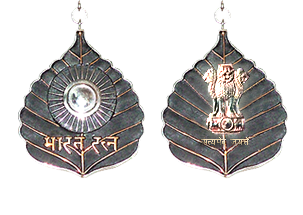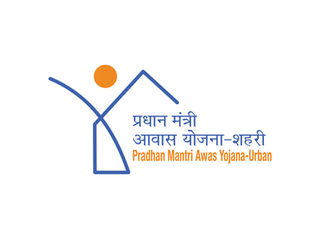Related Research Articles
Gamit is a Bhil language of India, spoken by the Gamit people of Tapi district of Gujarat and by some people in Surat, Bharuch, Dang and Valsad districts of southern Gujarat. It is also spoken in Nandurbar and by some people in Dhule district in northern Maharashtra. Some example of Gamit language story can be found at https://indiantribalheritage.org/?p=25003

The Indian honours system is the system of awards given to individuals for a variety of services to the Republic of India. The categories of awards are as follows:
Social security in India includes a variety of statutory insurances and social grant schemes bundled into a formerly complex and fragmented system run by the Indian government at the federal and the state level and is divided into three categories: non-contributory and tax-payer-funded, employer-funded and lastly, joint-funded. The system has since been universalised with the passing of The Code on Social Security, 2020. These cover most of the Indian population with adequate social protection in various situations in their lives. The Indian social security system is considered to be one of the most generous in the world amongst developing countries. The Central Government of India's social security and welfare expenditures are a substantial portion of the official budget and as well as the budgets of social security bodies, and state and local governments play roles in developing and implementing social security policies. Additional welfare measure systems are also uniquely operated by various state governments. The government uses the unique identity number (Aadhar) that every Indian possesses to distribute welfare measures in India. The comprehensive social protection system of India can be categorised as the follows: social assistance and mandatory social security contributory schemes mostly related to employment. The Code on Social Security, 2020 is part of the Indian labor code that deals with employees' social security and have provisions on retirement pension and provident fund, healthcare insurance and medical benefits, sick pay and leaves, unemployment benefits and paid parental leaves. The largest social security programs backed by The Code on Social Security, 2020 are the Employees' Provident Fund Organisation for retirement pension, provident fund, life and disability insurance and the Employees' State Insurance for healthcare and unemployment benefits along with sick pays. There is also the National Pension System which is increasingly gaining popularity. These are funded through social insurance contributions on the payroll. While the National Food Security Act, 2013, that assures food security to all Indians, is funded through the general taxation. With the passing of the social security code by the Indian Parliament, the fragmented social security system was universalised, resembling the social security systems of most developed countries.

Tulasi Munda is a social activist from the Indian state of Odisha. She was awarded the Padma Shri in 2001 by Government of India for her contribution to spreading literacy among the impoverished adivasi peoples of Odisha. Munda started an informal school in 1964 in Odisha's iron ore mining area to educate children from local adivasi populations, who would otherwise have ended up as child labour in the mines. She had been a child labourer in the mines of Keonjhar herself.
The Gamit are Adivasi, or indigenous Bhil people of Gujarat, India. They are mainly found in Tapi, Surat, Dang, Bharuch, Valsad and Navsari districts of Gujarat and some parts of Maharashtra. They are included in state list of scheduled tribes.

Pradhan Mantri Gramin Awas Yojana, previously Indira Awas Yojana, is a social welfare programme, created by the Indian Government, to provide housing for the rural poor in India. A similar scheme for urban poor was launched in 2015 as Housing for All by 2022. Indira Awas Yojana was launched in 1985 by Rajiv Gandhi, the Prime Minister of India, as one of the major flagship programs of the Ministry of Rural Development to construct houses for the Below Poverty Line population in the villages.
Pradhan Mantri Jeevan Jyoti Bima Yojana is a Government-backed Life insurance scheme in India. It was originally mentioned in the year 2015 Budget speech by the then-Finance Minister, late Arun Jaitley in February 2015. It was formally launched by Prime Minister Narendra Modi on 9 May in Kolkata. As of May 2015, only 20% of India's population has any kind of insurance, this scheme aims to increase the number.

Pradhan Mantri Awas Yojana (PMAY) is an initiative by the Government of India in which affordable housing will be provided to the urban poor with a target of building 2 crore (20 million) affordable houses by 31 March 2022. It has two components: Pradhan Mantri Awas Yojana(Urban) (PMAY-U) for the urban poor and Pradhan Mantri Awaas Yojana (Gramin) (PMAY-G and also PMAY-R) for the rural poor, the former administered by Ministry of Housing and Urban Affairs and the latter by Ministry of Rural Development. This scheme converges with other schemes to ensure houses have a toilet, Saubhagya Scheme for universal electricity connection, Ujjwala Yojana LPG connection, access to drinking water and Jan Dhan banking facilities, etc.

Pradhan Mantri Ujjwala Yojana was launched by Prime Minister of India Narendra Modi on 1 May 2016 to distribute 50 million LPG connections to women of Below Poverty Line (BPL) families. A budgetary allocation of ₹80 billion (US$1.0 billion) was made for the scheme. The scheme was replaced by the Ujjwala Yojana 2.0 in 2021.

Sulagitti Narasamma was an Indian midwife from Pavagada town, in Tumkur district of Karnataka state. She performed more than 20,000 traditional deliveries free of charge over a 70-year period of service in deprived regions of Karnataka with no medical facilities. Her work was honored with the National Citizen's award of India in 2012 and the country's fourth highest civilian award, the Padma Shri, in 2018.
Diwaliben Punjabhai Bhil, also known as Diwaliben Punjabhai Ladhia, was an Indian folk singer and playback singer from Gujarat. Her talent was discovered late; she then sang on radio and in Gujarati films and was awarded the Padma Shri in 1990.

Bhuri Bai is an Indian Bhil artist. She was born in Pitol village, situated on the border of Madhya Pradesh and Gujarat. Pitol is a village of Jhabua district in Madhya Pradesh. Bhuri Bai belongs to the community of Bhils, the largest tribal group of India. She has won many awards including the highest state honour accorded to artists by the Madhya Pradesh government, the Shikhar Samman. She was awarded India's fourth highest civilian award the Padma Shri in 2021.
Pradhan Mantri Garib Kalyan Anna Yojana is a food security welfare scheme announced by the Government of India on March 26 2020, during the COVID-19 pandemic in India. The program is operated by the Department of Food and Public Distribution under the Ministry of Consumer Affairs, Food and Public Distribution. But the nodal ministry is Ministry of Finance.
S Damodaran is the founder of the NGO Gramalaya based in Tiruchirappalli. Gramalaya, established in 1987, was initially focused on the economic improvement of rural people. Later, realizing that the more urgent and immediate concern is the unavailability of clean drinking water and toilet facilities, the NGO shifted their focus to water and sanitation. Gramalaya aims to eradicate open defecation by providing eco-friendly toilets. Gramalaya is now an important resource center of the Ministry of Jalshakti, Govt of India. The NGO has been functioning with the support of Government, donors and corporate groups under CSR initiatives. It was Gramalaya's efforts that helped transform the Thandavampatti village in Tiruchy into the first open-defecation free village in India in 2003.
Lata Desai is a medical doctor from the Indian State of Gujarat who is 1980 along with her husband Dr. Anil Desai and a few friends founded the Society for Education Welfare and Action - Rural, a voluntary organization devoted to health and development activities in the tribal area of South Gujarat.
Arjun Singh Dhurve is a folk dancer and a retired teacher from the Dindori district of the Indian State of Madhya Pradesh. He is famous for popularising Baiga folk songs and dance. Baiga Pardhauni dance is the main dance of the Baiga tribe. In this form of dance, the performers wear the masks of peacocks, elephants, horses, etc.
Darshanam Mogilaiah also known as Kinnera Mogulaiah, is an artist from the Indian state of Telangana and is one among a few surviving performers of a tribal musical instrument known by the name Kinnera. The kinnera is a stringed instrument much like a veena whose origin can be traced back to as early as the 4th century CE. The instrument is indigenous to the nomadic tribes and the Dalit communities in the Deccan Plateau such as the Dakkali, Madiga and the Chenchu. There are kinneras with different numbers of stairs or steps. Mogilaiah's forefathers were pioneers in making and playing kinneras having different numbers of stairs. His father had made a nine-stair kinnera. Mogilaiah was the first person to create a 12-stair kinnera and he is the only artist who makes and plays the 12-step kinnera. In the year 2022, Govt of India honoured him with the Padma Shri award for his contributions as a kinnera musician.
Prabhaben Shah was an Indian social worker. In 2022, she was awarded Padma Shri by the Indian Government for her contribution in social work.

Shanti Devi was an Indian social worker born in 1934 in Balasore district of Indian state of Odisha. She was awarded the Padma Shri award on 9 November 2021 by the President, Ram Nath Kovind at the Civil Investiture Ceremony-IV, at Rashtrapati Bhavan for her social works and efforts to bring peace in the Maoist-affected Rayagada region of Odisha. Devi received the Radhanath Rath Peace Award and was awarded the Jamnalal Bajaj Award in 1994.
References
- 1 2 3 "Citation for Padma Shri: Gamit Ramilaben Raysingbhai" (PDF). Ministry of Home Affairs, Govt of India. Retrieved 19 June 2022.
- 1 2 "Padma Awards 2022" (PDF). Padma Awards. Ministry of Home Affairs, Govt of India. Archived (PDF) from the original on 2022-01-25. Retrieved 11 February 2022.
- ↑ "Who Is Gamit Ramilaben Raysingbhai?". SheThePeople. Retrieved 20 June 2022.
- ↑ "Padma Shri Ramilaben Gamit is role model & inspiration for Adivasis: Gandhinagar BJP ST Cell chief Aarti Bhil". Navjeevan Express. Retrieved 20 June 2022.
- ↑ "Padma Awards 2022". Padma Awards. Ministry of Home Affairs, Govt of India. Archived from the original on 2022-01-29. Retrieved 11 February 2022.